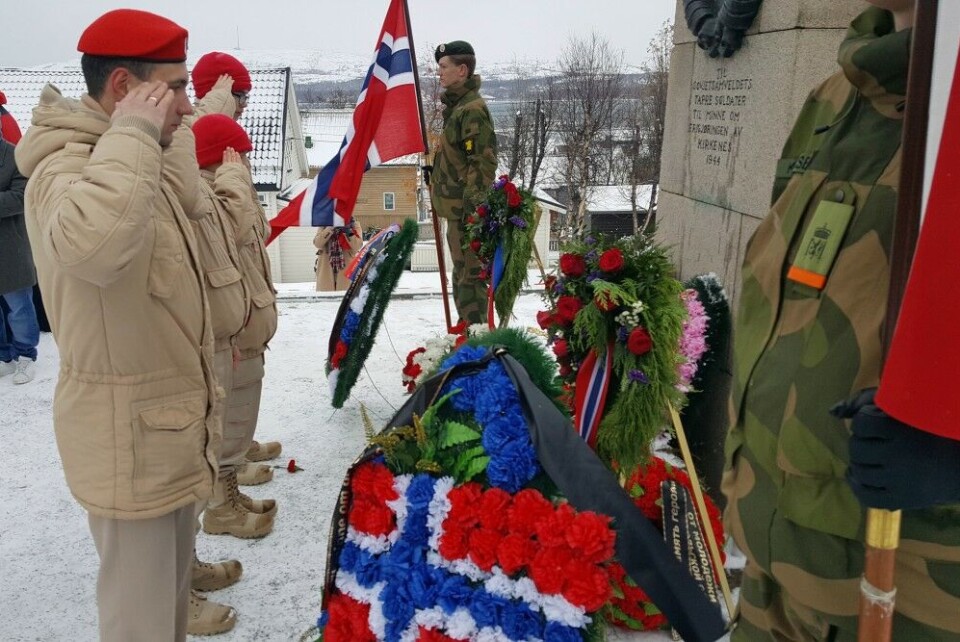
'Youth Army' calls in on Norway
Russia’s military-patriotic Yunarmiya – or Youth Army – got Norwegian funding to tour the country’s northeastern border region. The Norwegian Helsinki Committee says representatives of such movement should not have been invited to a peace anniversary.
Dressed up in red berets and kaki-color uniforms, the youngsters from Yunarmiya’s regional department in Arkhangelsk came to Kirkenes to commemorate the 75th anniversary of the liberation of Finnmark by Soviet troops in October 1944.
En route, the teenagers had first visited the Russian Northern Fleet’s headquarters in Severomorsk on the Kola Peninsula and two other Norwegian towns in eastern Finnmark; Vardø and Tana.
The call on Norway was organized in cooperation with a regional politician in Finnmark and the regional authorities of Arkhangelsk.
Yunarmiya has never been to Norway before, one of the boys tells to the Barents Observer.
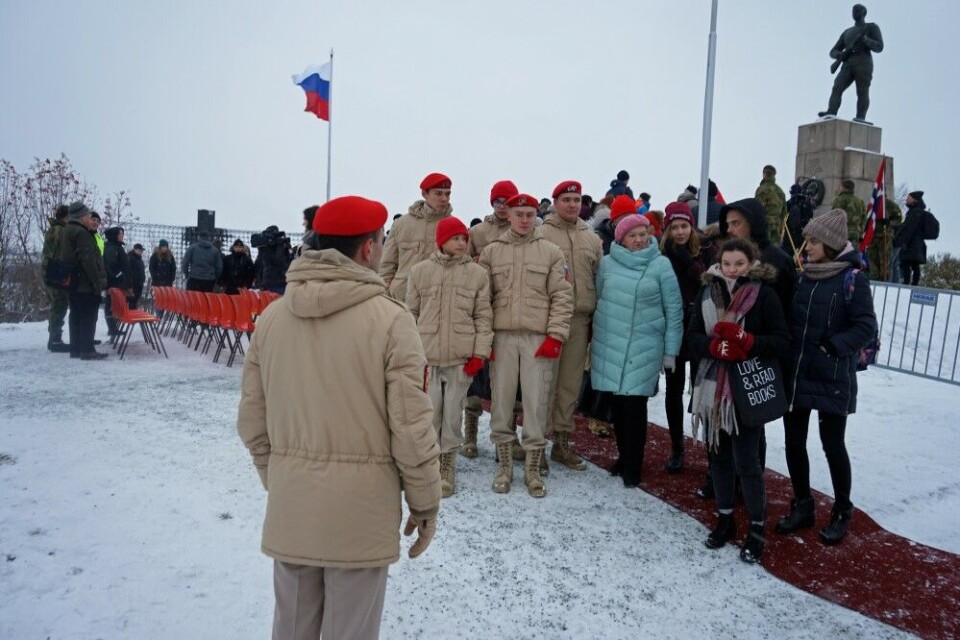
Since President Vladimir Putin ordered its establishment in October 2015, nearly 600,000 children and teenagers under 18 have joined the ranks of the Youth Army. An online counter on Yunarmiya’s portal keeps track of the number.
Focusing on firearm training, patriotism, national and military history and ceremonial duties, the movement is backed by Russia’s Ministry of Defense.
Critics of the movement say that the military should not be allowed to take such an active role in the upbringing of Russia’s children.
Commenting on Yunarmiya to the Barents Observer’s Russian media partner The Moscow Times, Valentina Grebenik, executive secretary of the Union of Committees of Soldiers’ Mothers takes a clear stand.
“It’s a crime,” she says.
“The militarization of childhood is banned by the [United Nations] Convention on the Rights of the Child. What is going on is an outrage against our kids and our society.”
On the Vkontakte pages of Yunarmiya’s Arkhangelsk branch, the expedition to Norway is given broad attention. Other posts are flavored with photos of children with weapons, including when learning how to take apart and reassemble a Kalashnikov assault rifle.
In one posting from the start of the tour to Norway, the group writes the expedition is organized by the Norwegian Barents Secretariat. Head of the secretariat, Lars Georg Fordal, however, denies this and says the grant application for the project was turned down.
“We can’t give grants to everyone that apply,” Fordal tells.
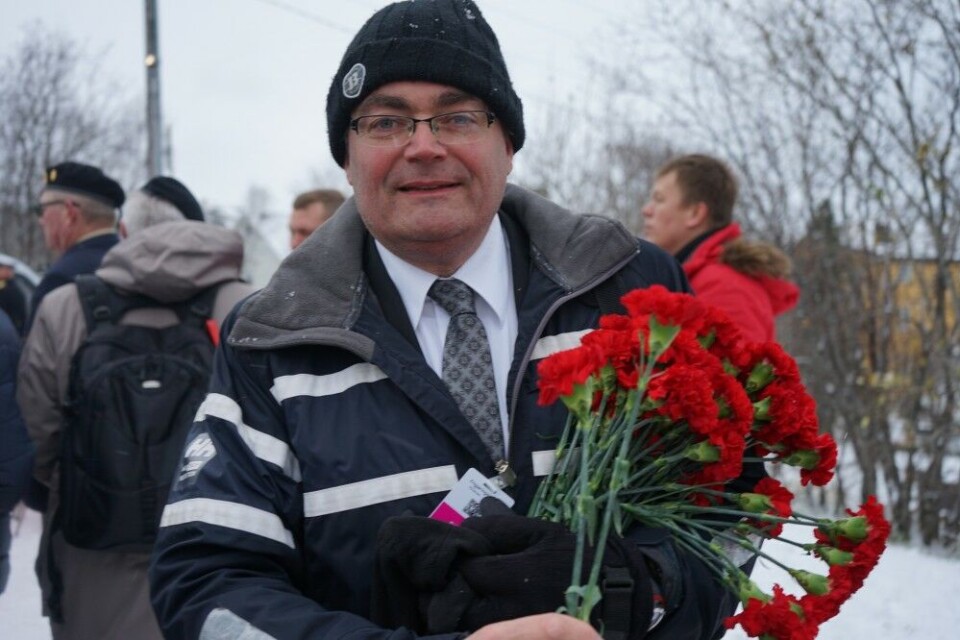
“Yunarmiya always welcomed”
Organizer on the Norwegian side, Remi Strand, a member of the Finnmark county parliament, says funding then came from Norway’s Consulate General in Murmansk.
“We got 50.000 kroner (about €5.000) from the Consulate General,” Strand tells.
Asked about the grant to Yunarmiya, Consul General Erik Svedal looks surprised and says he’s not aware of that, but will have to check with his staff when back in Murmansk.
Both the Barents Secretariat and and the Consulate General get money from the Ministry of Foreign Affairs to distribute for cross-border cooperation.
Remi Strand makes clear that this first tour will be followed by more Yunarmiya visits to this part of Norway.
“Yunarmiya is always welcomed to Vardø,” Strand says.
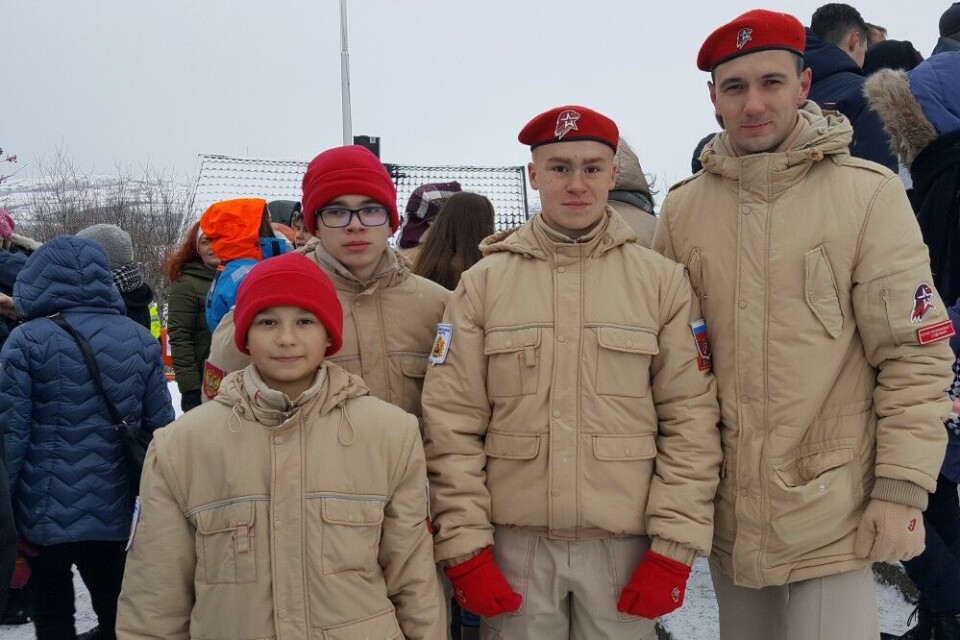
Militarization of childhood
Inna Sangadzhieva, Senior Advisor on Russia and Belarus with the Norwegian Helsinki Committee is critical to Yunarmiya which she says feeds children with the rhetoric of war.
“Militarization of society was a supportive element for the Soviet regime. Those days, the Communist Party was the head organization for ‘October Children’ and the ‘Komsomol’. These should cultivate the ideological affiliation already from the school bench, like uniting around the leader and communist ideology.”
Also, Sangadzhieva says, “One should be prepared to sacrifice one’s own life, when needed, if the enemy came.”
“Today, Russia is a kind of hybrid regime where communism is gone, while its militarizing elements remains. Like with Yunarmiya.”
Inna Sangadzhieva explains how the movement, that includes children as young as 11 years old, learn to be patriots, listen to orders without discussion and to be ready to sacrifice their lives.
“Many parents and civil society organizations have, of course, been critical of Yunarmiya. Children get used to the rhetoric of war from an early age, as if it is a part of a preparation for war.”
“Should not be invited”
Deputy Secretary General of the Norwegian Helsinki Committee, Gunnar Ekeløve-Slydal, says to the Barents Observer that Yunarmiya should not have been invited to commemorate the 75th anniversary of the liberation of Finnmark by Soviet troops in October 1944.
“We are critical to creating loyal soldiers from childhood, without a critical sense in a country struggling to fulfill human rights,” he says.
“Representatives of such an organization should not be invited to a peace anniversary.”
In Kirkenes on Friday, the two foreign ministers of Russia and Norway, Sergey Lavrov and Ine Eriksen Søreide agreed to resume the human rights dialogue between the two countries.
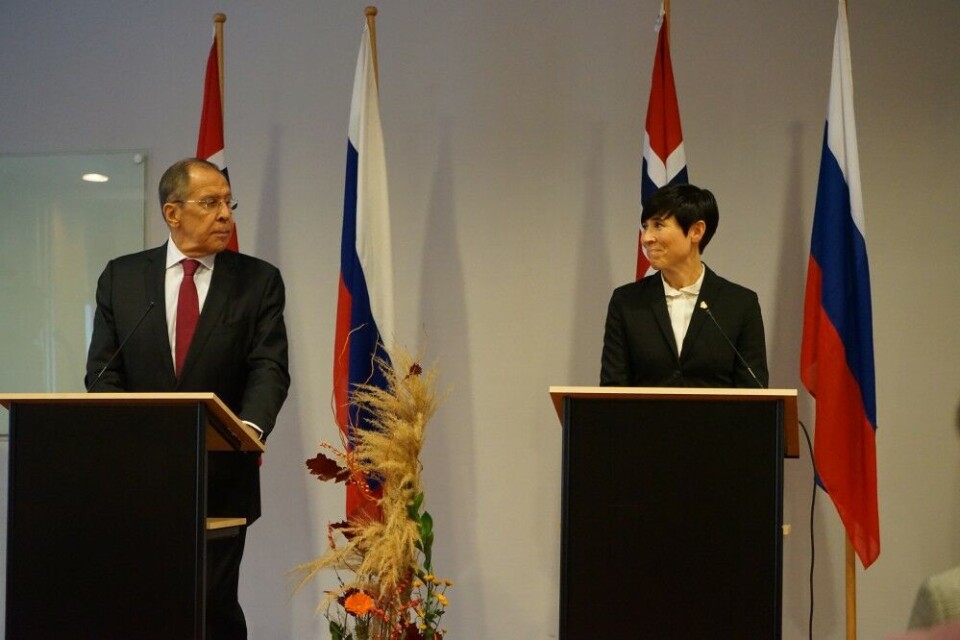
UPDATE COMMENT (Oct. 28th): Remi Strand, organizer of the project on the Norwegian side, is of the opinion that this article gives a wrong impression of the youth project he argues is aimed at contributing to increased contact and understanding among youth across the borders in the Barents Region. Read his comments here (in Norwegian).
You can help us report more about cross-border cooperation up north.
…. we hope you enjoyed reading this article. Unlike many others, the Barents Observer has no paywall. We want to keep our journalism open to everyone, including to our Russian readers. The Independent Barents Observer is a journalist-owned newspaper. It takes a lot of hard work and money to produce. But, we strongly believe our bilingual reporting makes a difference in the north. We therefore got a small favor to ask; make a contribution to our work.
















